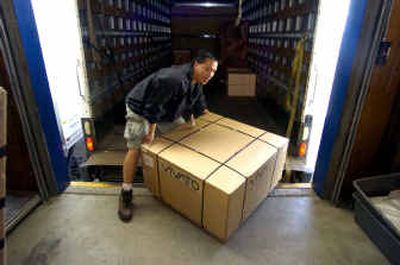Small operation offers flexibility

When Pacific Northwest National Laboratory engineers in the Tri-Cities recently needed to ship large sections of a sensor tower to Barrow, Alaska, they called on Pilot Air Freight to take care of the details.
The shipment, from Richland, Wash., to the northernmost location in the United States, took a little more than 60 hours from pickup to delivery.
Pilot Air Freight sent a Spokane driver to get the towers. He hauled them by truck to Seattle, where the towers were loaded aboard an Alaska Airlines flight to Anchorage. Another flight eventually hauled the tower sections to Barrow, considered one of the most remote destinations in the country.
“If they had tried to use FedEx or UPS, they wouldn’t have been able to do it the way we did, for the cost we did,” claimed Chad Hawley, Pilot Air Freight’s general manager in Spokane. UPS or FedEx would have hired a secondary trucker to transport the sections, since they see Barrow as too small a destination for their own crews, he said.
For Pilot Air Freight, which has eight workers in Spokane, that job to Barrow was just another shipment. The small business considers itself the plucky Mr. Reliable of freight forwarding companies here, Hawley said.
A freight forwarding company identifies the best way to move a shipment from one spot to another. In Pilot Air Freight’s case, it has four Spokane-based trucks, but no airplanes of its own.
Its area customers are mostly small to mid-sized firms needing to ship goods anywhere on the planet.
Sometimes Pilot decides to use a FedEx plane to haul a shipment to another city, then uses one of its partner companies to pick it up and take it to its destination.
Other times, Pilot puts the shipment on a flight operated by a commercial airline. “It all depends on the needs of the customer, and the time they have for the delivery,” Hawley said.
Rates paid by customers depend on the total weight and how far the products are going.
Freight forwarding companies tend to come and go, as various operators test the market and try to compete against each other, said Todd Woodard, spokesman for the Spokane airport. “Pilot Air Freight has developed its niche by focusing on customer service and flexibility,” said Woodard.
Another advantage Pilot Air Freight has is a national network of more than 50 sites, said Hawley. A shipment from Spokane to one of those sites means a simple transfer and delivery by the same company.
As the area’s economy has rebounded, Pilot Air Freight’s Spokane office has seen higher sales — projected to be $3 million this year, up from $1.6 million in 2002 — but also has faced more companies competing for the same business.
So far in 2005, Pilot’s drivers are seeing fewer total shipments, but each load has been heavier than last year, said Hawley.
“We’re getting about 470 pounds on average (per shipment) versus about 418 last year at this time,” he said. The busiest time of the year is from June through September, as companies send more goods and retailers start stocking items for the fourth quarter, he said.
Spokane’s Pilot Air Freight operation started in 1994, when two Seattle businessmen, Patrick Allen and Selden Daniels, obtained the Spokane franchise rights. The two also operate Pilot Air Freight franchises in Seattle and Boise.
Hawley said the key difference between companies like Pilot and the larger operators is flexibility. If a customer wants to get an item out to the airport by 5 p.m., FedEx will give them a deadline by which it needs to be ready to ship.
If the company needing the item shipped misses that deadline, Hawley said, it will have to wait until the next day for a scheduled pickup.
“We’ll work with the customer, ask them when their ready-to-ship time is, then we’ll be there,” he said.
Pilot has learned how to diversify. Back in 2000, its largest account was Telect, Inc., the Liberty Lake manufacturer that at the time was spending about $30,000 per month on shipping.
Today, a much smaller Telect is shipping just a fraction of that amount.
Hawley’s largest single account currently is Columbia Lighting, a Spokane Valley manufacturer that’s facing its own problems, said Hawley. The manufacturer has laid off more than 30 workers and employees there have said they fear more cuts are coming.
“We’ve learned not to put all our eggs in one basket,” Hawley said. “Diversifying is certainly the key to growing.”